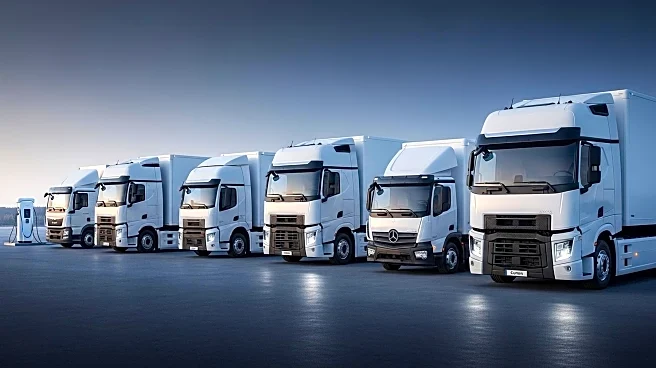What's Happening?
Mercedes-Benz Trucks is set to unveil an expanded portfolio of the second-generation battery-electric eActros on September 30. The new offerings will include a variety of configurations such as tractor units, flatbed chassis with different wheelbases, models with two battery packs, and alternative L-cab versions. These new configurations are based on the eActros 600, which boasts a high battery capacity and efficient electric drive axle, enabling a range of 500 kilometers without intermediate charging. The eActros 600 has been in operation across Europe and has been recognized as the 'International Truck of the Year 2025'.
Why It's Important?
The expansion of the eActros family underscores Mercedes-Benz Trucks' commitment to electric mobility and sustainable transportation solutions. This development is significant for the logistics and transportation industry, as it offers a viable alternative to traditional diesel-powered trucks, potentially reducing emissions and operational costs. The introduction of diverse configurations caters to various commercial needs, enhancing the flexibility and appeal of electric trucks. As the industry moves towards electrification, Mercedes-Benz Trucks' innovations could set new standards for performance and efficiency in electric commercial vehicles.
What's Next?
With the unveiling of new eActros variants, Mercedes-Benz Trucks is likely to attract interest from logistics companies seeking sustainable solutions. The expanded portfolio may lead to increased adoption of electric trucks, prompting other manufacturers to accelerate their own electric vehicle development. As charging infrastructure improves, the operational range and efficiency of electric trucks will continue to enhance, potentially transforming the commercial vehicle landscape. Stakeholders will be watching for further advancements in battery technology and vehicle design that could influence future market trends.
Beyond the Headlines
The focus on electric trucks reflects broader environmental goals and regulatory pressures to reduce carbon emissions in the transportation sector. This shift could have long-term implications for industry practices, supply chain management, and urban planning. Additionally, the success of the eActros family may influence public policy and investment in electric vehicle infrastructure, driving further innovation and adoption in the commercial vehicle market.












